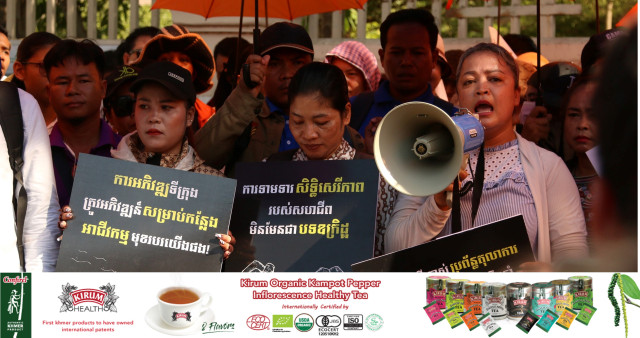Circus Performances Helped Engage Bunong Communities with Wildlife and Forest Protection

- By Meng Seavmey
- January 29, 2024 6:10 PM
SEN MONOROM – For three days, circus artists from Phare Ponleu Selpak and volunteers from a Bunong ethnic group jointly taught young people in Mondulkiri province how to protect wildlife and forests, through performances and dances.
The campaign was held in three districts: Keo Seima, Ou Reang, and Pech Chreada. Cambodia’s representation of the international NGO World Hope International (WHI) organized the event that took place from Jan. 23 to 25. It received support from USAID, the Ministry of Environment, Mission Alliance, REDD+, and the Wildlife Conservation Society.
The three targeted districts are home to large Bunong communities, a local ethnic group that has been playing a key role in nature conservation for centuries as its lifestyle primarily depends on forests.
Seng Mang, WHI’s program manager, said the campaign aimed to integrate youth's engagement in conservation works.
To do so, Mang chose to rely on circus and music performances, including singing, dancing and acting. Such mediums best capture children’s attention and are perfectly suited for carrying educational messages.
“With only a speech or conference, it would not be attractive to youth. But when packing messages into music or some kind of show, children are more open to them and more likely to spread the message to other people when talking about the performances they attended,” Mang said.
Indigenous ethnic groups represent 60 percent of the population in Mondulkiri province. Of these, Bunong accounts for 54 percent of the groups, according to the Mondulkiri Project organization.
Circus and music to integrate wildlife and forest knowledge
For three days, Battambang-based circus Phare Ponleu Selpak, used their skills as circus artists to entertain students while teaching them how to be aware of and protect their environment.
“[My tale] told the story of the solidity of the people living around the Keo Seima Wildlife Sanctuary in promoting wildlife and forest protection. These strong people have a better life thanks to all the trees that surround them,” said Som Mony who was the writer and moderator of the three-day performance.
The story stressed that education is the foundation that helps make better decisions in self-development and community-led activities to create safe and sustainable livelihood, especially among Bunong groups who used to depend greatly on nature.
But fast-paced development in the region has led some of them to turn their back on traditional beliefs and engage in illegal deforestation or poaching in a move they considered a “shortcut” to patch their immediate need for money.
In addition to circus artists, a few young volunteers from different Bunong ethnic groups sang songs in the Bunong language to raise awareness about the need for forest and wildlife protection.
Among those, Douk Yunas, a sophomore majoring in Information Technology, rearranged Sinn Sisamouth’s hit “Because of You”. He changed the headline to “Forest Flower” and translated the lyrics into the Bunong language.
Yunas spent a week on the new lyrics and changed the meaning from a love story between two people to tourism promotion for Mondulkiri province. The song describes the rich natural resources found in Bunong communities and the province, including waterfalls, hills, sanctuary areas and wildlife.
“Bunong group has been living off the natural resources and considered the forest as their oxygen,” Yunas said, adding that an increasing number of them are aware of the current risks challenging nature and are joining in conserving the resources for eco-tourism purposes.
Encouragements for students’ education and violence ceasing
With going to local communities, the campaign also took the opportunity to raise awareness about the urgent need to stop domestic violence and reduce school dropouts among local families and young students, according to the program manager.
“When domestic violence happens, people tend to focus on the problem and forget about the conservation work,” he said.
“People are the ones who deforest and hunt wildlife, so people are also responsible for the conservation work,” he added.
“Therefore, the two ideas have to walk in parallel. It goes the same to gender equality. Not only men can do the job, but women can also join.”















